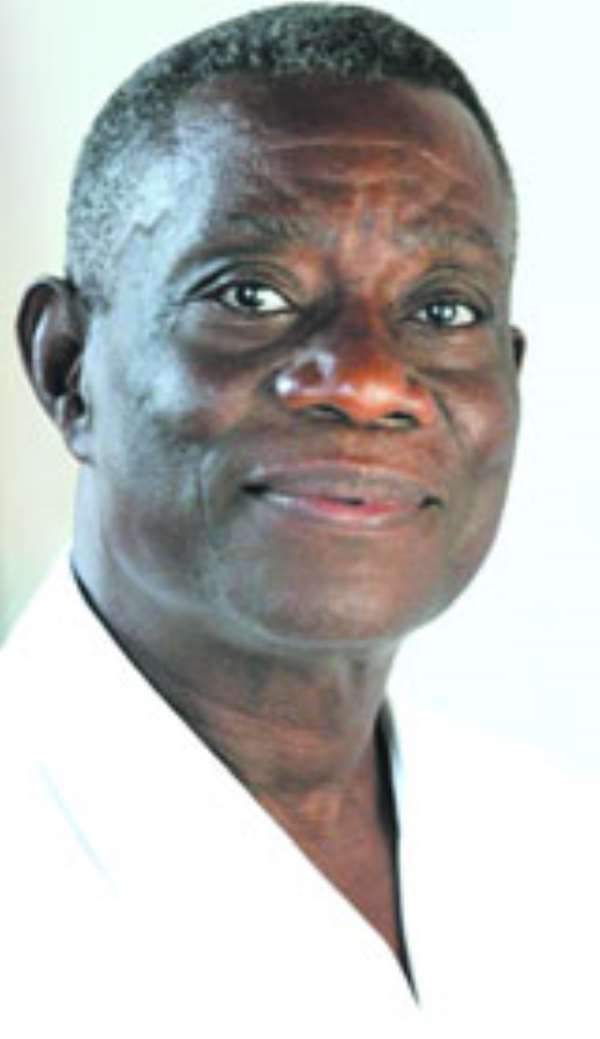In Tamale in Noord Ghana vonden we een opmerkelijk en sterk artikel
uit de Ghanian Chronicle door Dr. Hippolyt Pul.
Vertaling met dank aan Gonny van der Linden - Pul.
uit de Ghanian Chronicle door Dr. Hippolyt Pul.
Vertaling met dank aan Gonny van der Linden - Pul.
Visieloos leiderschap, de oorzaak van Ghana's achterstand in ontwikkeling
Dr. Hippolyt Pul
door Ghanaian Chronicle
Volgens de heer Hippolyt Pul, Coördinator van de All Africa Peace Building Initiatives van de Catholic Relief Services (AAPI/CRS) is visieloos en ineffectief leiderschap de vloek van de onderontwikkeling van het land en de noordelijke regio in het bijzonder. Hij zei dat de situatie was verergerd door de overpolitisering van bijna alles in ons politieke bestel in die mate dat er geen betekenisvolle consensus kan worden bereikt over de uitvoering van belangrijke nationale zaken. De heer Pul zei dit toen hij een toespraak hield over 'Leiderschap, de ontbrekende schakel in de politiek van ontwikkeling' tijdens de derde Cardinal Dery Memorial Lectures in Tamale in het weekend.

|
|
Dr. Hippolyth Pul |
Wijlen kardinaal Porekuu Dery werd in 1951 tot priester gewijd en gestationeerd in Nandom, waar hij diende als kapelaan en lokaal manager van scholen. In 1957 werd hij benoemd tot de eerste Afrikaanse pastoor van de parochie Kaleo. Kardinaal Dery werd op 8 mei 1960 door paus Johannes XXXIII tot bisschop gewijd. Kort daarna werd hij bevorderd tot aartsbisschop. Op 30 juni 1994 ging hij met emeritaat als aartsbisschop van Tamale en op 24 maart 2006 werd Aartsbisschop Dery door paus Benedictus XVI benoemd tot kardinaal-diaken, een erkenning voor de grote bijdrage die hij heeft geleverd aan de kerk in Ghana, en voor de samenleving als geheel. De kardinaal overleed op 6 maart 2007, tijdens het 50-jarig jubileum viering van de onafhankelijkheid van Ghana. De heer Pul merkte op dat in plaats van visionair en moedig leiderschap, de natie was belast met egoïstische, onpatriottische en corrupte leiders, die, in tegenstelling tot de leiders in de Aziatische landen, hadden nagelaten strategische nationale plannen te bedenken om hun mensen te motiveren hun visies voor de snelle ontwikkeling van hun landen te omarmen. Hij zei dat er de neiging was om elke kwestie van publiekbelang te politiseren en 'partijdig te maken'. De belangen en tegenstellingen zijn zo groot dat ze niet in staat zijn om een emotieloze en objectieve discussie te voeren, over wat dan ook, zonder elkaar te beschuldigingen. En merkte verder op dat het triest was dat onze politieke leiders een dergelijk gedrag aanwakkerden. De heer Pul zei dat het onvermogen om onpartijdig te debatteren en het eens te worden over zaken had bijgedragen aan het ontbreken van nationale agenda's over wat dan ook. Beleid en programma's veranderen net zo vaak als regeringen veranderen. 'Naties die de ketenen van armoede hebben doorbroken en de ontwikkeling hebben ondersteund van hun burgers hebben dit gedaan op basis van gezamenlijk overeengekomen agenda's. Politieke debatten in dergelijke landen gaan niet over wat er in welke sector moet worden gedaan, maar over hoe het het beste kan worden gedaan wat er moet gebeuren, zei hij. Helaas, in dit opzicht, zei de AAPI-coördinator, zou Ghana nog steeds op zoek kunnen zijn naar haar politieke Mozes, een sterke visionaire leider, die pleiten voor processen voor het creëren van nationale consensus over wat nodig is om te doen, en vervolgens mensen van alle politieke en partijdige overtuigingen te mobiliseren om die visie te aanvaarden en uit te voeren. De heer Pul zei dat het onderwijssysteem, het Stamhoofden systeem en bepaalde culturele overtuigingen in het land ook in grote mate hadden bijgedragen aan de onderontwikkeling en armoede, te midden van de talrijke natuurlijke hulpbronnen die het land heeft. Hij zei bijvoorbeeld dat één van de dingen die de Aziatische landen, vooral Singapore, onder leiding van Lee Kuan Yew deden, waren strategische en duurzame investeringen in de ontwikkeling van het menselijk potentieel, door middel van onderwijs. Hij zei daarentegen dat het onderwijssysteem van Ghana zo was gepolitiseerd dat opeenvolgende regeringen zijn blijven sleutelen aan het onderwijssysteem zo erg dat 'onze kinderen nooit weten wat voor soort onderwijs van het ene op het andere jaar van ze wordt gevraagd om aan deel te nemen’. Om de situatie te verhelpen en de weg vrij te maken voor de ontwikkeling van het land, heeft de heer Pul politieke partijen en andere belanghebbenden, zoals traditionele autoriteiten aanbevolen te investeren in het opleiden van toekomstige leiders voor hun belangengroepen, door middel van formele en praktische ontwikkeling van hun capaciteiten. Het leiderschapstrainingen- en screeningproces moet alle aspiranten inprenten dat een politiek ambt vooral, de deugden van eerlijkheid, rechtschapenheid, verantwoordelijkheid en een toewijding aan de nationale zaak in zich draagt. Hij suggereerde ook aan politieke partijen een verandering van de manier waarop ze kandidaten selecteren voor leiderschapsposities in de staat. En dat deelname aan partij- of stakeholdercongressen, en het vermogen om aan de financiële vereisten voor kandidatuur te voldoen, niet de enige instrumenten mogen zijn voor de selectie van presidents- en parlementskandidaten. Hij zei dat het eerder een vereiste zou moeten zijn dat die potentiële kandidaten een of andere vorm van leiderschap en ideologische training hebben moeten ondergaan, die in overeenstemming is met de blootstellingen en de capaciteiten die nodig zijn voor effectieve prestaties op het niveau van waarop zij een politiek ambt zoeken. ? GNA
Bron 10-05-2011 : Modern Ghana [ 10 ]


